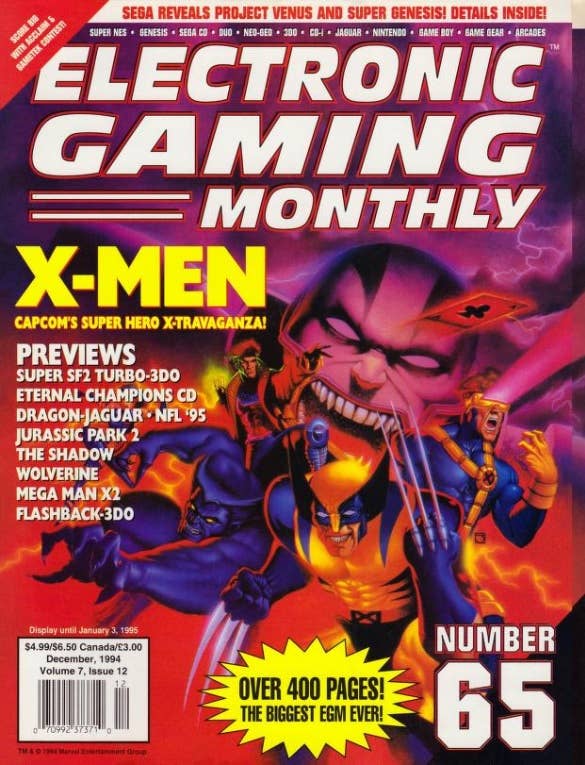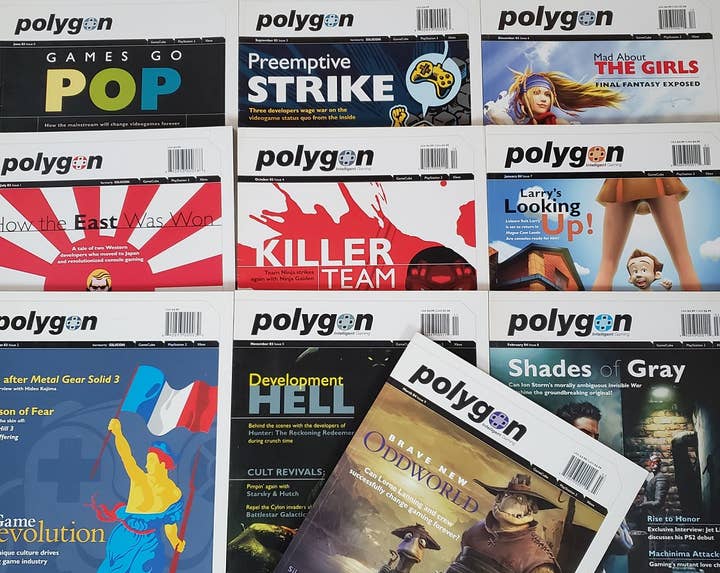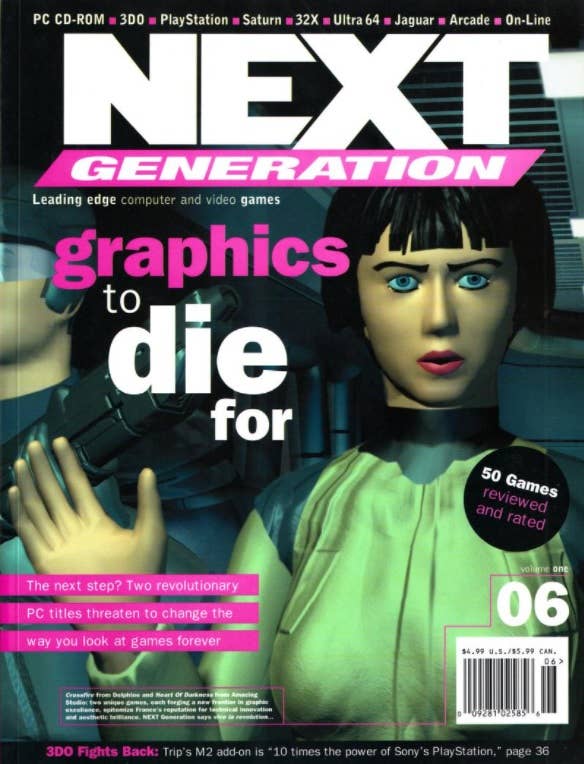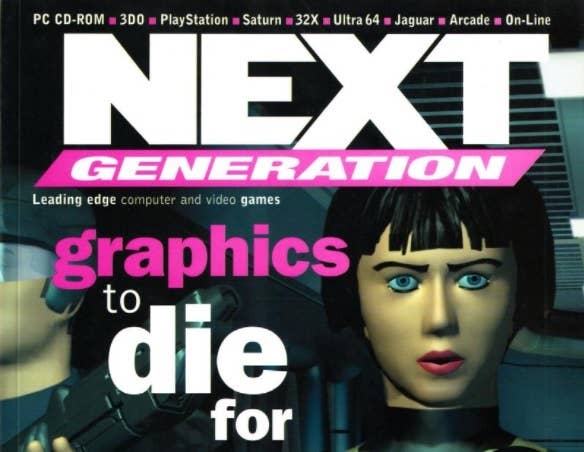Does the gaming press of old hold up today? | This Week in Business
They don't make game journalism like they used to, and that's probably a good thing
This Week in Business is our weekly recap column, a collection of stats and quotes from recent stories presented with a dash of opinion (sometimes more than a dash) and intended to shed light on various trends. Check back every Friday for a new entry.
With Black Friday in the rear view and few big releases left in 2021 beyond Halo Infinite, the industry news cycle has begun its annual slowdown in preparation of a mid-December hibernation.
That gives us a little time for reflection, and to be even more self-indulgent in this space than usual. And what better way to indulge than by rambling for a few hundred words about a tweet I saw?
QUOTE | "What gaming magazine did you enjoy reading as a kid and does it still hold up reading it today?" - The Twitter account for Retro Gamer magazine this week.
First off, this tweet is engagement bait. But it's also effective engagement bait and it isn't deliberately constructed in the name of controversy -- "One of these four widely beloved things has to go" or "You have $15 to spend on things split between several tiers and we placed divisive things in those tiers at random" -- so let's engage.
When I was a kid, Nintendo Power was the must-read option because as an official Nintendo product, it naturally had tons of exclusive coverage for the only system I had at the time, the NES. As I got older and the Genesis and TurboGrafx-16 joined the market (and my living room), Electronic Gaming Monthly became the periodical of choice.
But one magazine a month wasn't enough gaming coverage for my tastes, so I regularly supplemented it with the likes of GamePro, EGM2, PC Gamer, Diehard Gamefan, maybe even a Video Games and Computer Entertainment here and there. By the mid-'90s, I had added Next Generation (the US counterpart to Edge) as I very much appreciated its presentation and attempts to offer an elevated approach to the medium.

In short, I read a ton of gaming magazines. I read them cover-to-cover until the covers fell off. From the art to the layouts to the tone of the writing, they were just fun. I was excited about games, and they both validated and amplified that excitement. They largely set my priorities in assessing games as a kid.
For example, I quickly learned that it's about gameplay above all else. But having said that, cutting edge graphics are cool and new, more powerful technology will not only always make older games look terrible and obsolete, it will allow us to explore heretofore unimagined emotions, perhaps even to one day... cry? Because that's the goal of real art and games are definitely real art that everyone should take super seriously, but also people who worry that they could possibly affect players in any way beyond improving hand-eye coordination are undeniable fools who just don't get it.
In a lot of ways, I learned to write about games by digesting those magazines and internalizing their styles and priorities. I eventually even wrote for one in 2003 and 2004: the short-lived and barely remembered Polygon Magazine (no relation to the current website Polygon), which marketed itself as a high-brow magazine for "intelligent gaming."

QUOTE | "It's a little like a store or restaurant that positions itself as being classier than the competition. You're painting a target on your back and you better be sure you can back it up. And Polygon, unfortunately, often could not." - Part of an assessment of Polygon magazine in one of the only online indicators it every really existed, a recent write-up on Paperwave, the substack newsletter of IGN's Justin Davis.
Davis then takes a few well-justified shots at Polygon, like the decision to put Leisure Suit Larry on the cover with a cheerleader upskirt shot, a feature on how to get your girlfriend into games "which was horribly out-of-touch even in 2004," and a line referring to a game as "so Japanese it smells like sushi."
QUOTE | "Polygon's occasional outbursts of casual sexism and low-brow humor almost feel reflexive. By my totally unscientific estimation, about 90-95% of the magazine's work is really good." - The same write-up.
I'm too close to the material to be objective -- and too far removed temporally to be sure I'm remembering things properly -- but I think "reflexive" and "casual" are good words to describe the sexism and low-brow humor. So are autonomic, unconscious, and above all else, thoughtless.
Even if we were actually achieving our ambitions with 90-95% of the work (which strikes me as overly generous but I'll allow it), the rest of it was the result of reverting to a default, regurgitating content that fit with our preconceptions and expectations of what a gaming magazine was. And even the stuff that did work -- Davis pointed to a cover story I wrote about the final hours of development before Hunter: The Reckoning Redeemer was sent to Microsoft for certification -- doesn't work by today's standards.
QUOTE | "Tough to say how embellished the report is, but Polygon seemingly embedded itself directly within the Hunter: The Reckoning Redeemer team from 6pm to 2am as they crunched to complete the game in its final hours. The feature largely glorifies crunch, as did virtually all aspects of the discourse at the time, but it's still an honest, fascinating look at a side of gaming still rarely covered in so much moment-to-moment detail." - Davis' assessment.
First off, I really was there at the High Voltage studio until 2 am, much to the chagrin of the PR person who was obligated to shadow me and clearly expected to be home much earlier. (I still feel bad about this.) Second, the feature does glorify crunch in ways that seem callous and irresponsible in hindsight.
It talks about people working 36-hour shifts and not leaving their desks all night except to run to the vending machine for -- literally, I kid you not -- Doritos and Mountain Dew. It talks about how High Voltage was wrapping up work on four different games that holiday season and developers were rolling from one to the next without time to catch their breath, much less spend quality time with their spouses or young children. It talks about the flu running rampant over a studio of people with weakened immune systems from working themselves so hard. But any criticism of the practice has to be inferred, because there's no such message in the text, and as far as I remember, none was even implied.
That was just the way people talked about crunch at the time, so it didn't occur to me to consider the longer-term consequences of it. Crunch was seen as a signifier of just how passionate people were about making a great game, and what lengths they would go to in the name of delivering that, by both developers and the press who covered them. You can bet High Voltage wouldn't have agreed to the article if it thought there was any chance it was going to turn out differently.
So even one of the supposed highlights of a magazine that prided itself on being a bit smarter than the rest still reflected a fairly thoughtless approach to the subject matter. Because I didn't really think about it. And neither did most of the game journalism of the time.

Game journalism today is generally less interested in serving as a marketing arm for game companies and more readily looks to serve an audience whose interests don't always align with those of publishers. Reviews have broadened to critically engage with creative works as well as evaluate products. News keeps people up to date with more than just what games are coming out when, and there's more legwork than ever going into it as reporters regularly dig up primary sources, sift through regulatory and legal filings, investigate companies with a variety of cultural issues, and shed light on complex and poorly understood issues.
Consumer sites are increasingly wading into coverage of legal actions, earnings calls, workers' rights, and everything else that happens around games but isn't actually games. Writers of all kinds are more aware of the ethical and practical considerations that go into their work, from accepting gifts to agreeing to embargos and disclosing conflicts of interest.
Oh, and the internet happened, so the gaming press you read today can cover what's happening today rather than what happened a couple months ago. That's a big change.
The actual economics of games journalism are admittedly as unsteady and unsustainable as ever, but the work itself is often exemplary and improving every year.
For all the things it might have gotten right, game journalism of decades ago took a very blinkered view of gaming. And as much as I don't want to downplay the contributions of the people who built this field (or dismiss my own prior work), I'm confident in saying that it's in a far better place today because every successive generation of talent sees what came before and pushes it that much further.
We are standing on the shoulders of... well not giants, exactly, but largely young and untrained people who were doing the best they could. People who probably figured they just had a cool job writing about a thing they loved rather than thinking they were fundamentally shaping the way people relate to video games, with all the responsibility that entails.
So no, as much as I loved seeing one of those phone book-sized holiday EGMs land in my mailbox each year and would happily re-read them today in a heartbeat, the gaming magazines of my youth do not hold up, because the games journalism we have today is better researched, more thoughtful, and more responsible in every way that matters.
The rest of the week in review
QUOTE | "We're aware of ongoing DDOS attacks affecting @Titanfallgame. To the Titanfall community: Help is coming ASAP." - In April, Respawn Entertainment let Titanfall fans know it had heard their pleas and would be fixing the problem soon.
QUOTE | "We've made the decision to discontinue new sales of the original Titanfall game starting today and we'll be removing the game from subscription services on March 1, 2022." - Respawn Entertainment this week lets Titanfall fans know exactly how it plans to fix the problem.
QUOTE | "The Stopping Grinch Bots Act" - The actual name of a piece of US legislation seeking to curb the practice of scalpers using automated means to buy up in-demand items like the PS5 and Xbox Series X as soon as they hit online storefronts. It was introduced by Representative Paul Tonko, who also introduced the Stopping Grinch Bots Act of 2019, and the Stopping Grinch Bots Act of 2018, neither of which made it out of committee.
Tonko, stop trying to make Grinch happen. It's not going to happen. It clearly needs a better acronym, like the one on the Better Online Ticket Sales Act (BOTS Act) you co-sponsored in 2016. Now that's an acronym that can draw bipartisan support.
STAT | No. 1 - Last week was the best week ever for UK sales of Nintendo Switch hardware and PC VR hardware, according to GfK Entertainment.
STAT | 27.4 million - Steam's peak concurrent users on Sunday, a new record for the platform. Counter-Strike: Global Offensive was the most popular game on the service with more than 900,000 players in that 24-hour span.
STAT | About $2.21 million - The amount of money GOG.com has lost CD Projekt through the first nine months of 2021. It was $1.37 million in the black at the same point of 2020.
STAT | 4.2% - The percentage of Nintendo managers in Japan who are women, a number the company hopes to increase.
QUOTE | "I filed one of many HR complaints against senior-level management and my contract was immediately terminated in response without any form of resolution or investigation." - A Writer's Guild of Great Britain member explains their issue as part of a survey the union conducted that found 53% of game writers have experienced or witnessed bullying at work.
QUOTE | "There has to be a commitment to addressing the problems when the problems are given in. There are something like 30-40% of employees who believe if they make a complaint about a DEI-related matter, then that is just going to be made to go away... There's the old maxim that it's not enough for justice to be done; justice must be seen to be done." - In an interview about Super.com's efforts to diversify its employee base, chief people officer Chris Davies talks about how the HR profession can regain the trust of marginalized employees after HR departments have been complicit in so many recent scandals.
QUOTE | "To [Activision Blizzard CEO Bobby Kotick]: Your inaction and refusal to take accountability is driving out great talent and the products will suffer until you are removed from your position as CEO." - Blizzard senior test analyst Jessica Gonzalez posted her resignation letter to Blizzard on her Twitter account. She is not only leaving Activision Blizzard, but leaving the games industry entirely.
STAT | 6% - Out of 284 Call of Duty players surveyed who didn't buy Vanguard this year, 6% said it was because they didn't approve of Activision Blizzard's treatment of employees. More commonly given reasons were how the game did in reviews (20%), general exhaustion with Call of Duty (34%), and being too busy playing other games (55%). If Activision Blizzard is going to be pressured into making changes, it likely won't come from consumers voting with their wallets.
STAT | Roughly $1 trillion - The amount of all investments overseen by six state treasurers who wrote a letter to Activision Blizzard asking for a meeting with its board members to discuss the company's response to sexual harassment and gender discrimination allegations and reports. The treasurers expressed concern that Kotick and the board are unable to make needed changes to the company culture, and in their capacity as Activision Blizzard shareholders, would consider voting against the re-election of incumbent directors. Kudos to the 6% above acting out of principle, but this will probably get the board's attention a bit more clearly.

